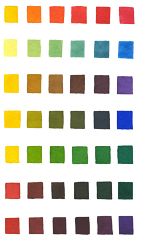
~ schedule ~ assignments ~ stories ~ crafts ~ books ~ pigments ~ websites ~ forum
Assignments

- Overview
A variety of different activities are assigned in this course for a variety of purposes. Your final grade will depend on the summation of your effort and success in each category. Each activity will require some work on your part outside of lecture and studiolab periods. A description and purpose for each activity is detailed in the sub-sections below, also accessed directly through links in the menu in the column at left.
- StudioLab
The overall aim of the course is to make connections between the materiality of how art is created and the materiality of how science is done. Therefore, hands-on work in the lab is an essential part of the course pedagogy as well as the philosophy of The Stuff of Art. Your role as a class member participating in the studiolab experience will be evaluated based on your attendance (35%), your preparation (15%), your careful attention to both the procedure and to safety (25%), and the quality of your craft (25%). It is not expected, of course, that you enter the studiolab with experience in all operations. It is expected that you will give the highest attention to procedural and safety instructions given prior to and during the class period and that you arrive to studiolab having read, digested and written the procedure for the day's work in your notebook. As the course progresses and your knowledge of chemical nomenclature and symbols increases, your preparation should include writing relevant chemical equations and a consideration of mass balance for reactions.
- Notebook
You should obtain a notebook for this course that will serve several functions. It will, first, be a place to write out procedures and notes for studiolab activities, and where you will record observations and questions or ideas during the lab period. Second, the notebook is where you will write a formal summary of each week's studiolab craft or activity, including chemical symbolism (old and new!), chemical equations (where appropriate), The notebook will also be the place where you should keep a journal of your learning in this course. As examples, you can write your reflections on the studiolab experience afterwards. You can write entries reflecting on the lecture material. You can record there questions that occur to you concerning the crafts, the materials, or any other materials you find relevant. Your notebook will be collected periodically for evaluation.
- Weekly Quizzes
"Weekly quizzes" likely sounds like some punishment ... but frequent quizzes are really to help you learn all the new vocabulary and concepts that will be introduced this semester. In this way you will hopefully be able to more quickly begin to utilize the chemical concepts in your notebooks and in your reading. We have no time to lose(!), so these quizzes will be short, multiple choice or short answer in style, given during the last 10 minutes ( or so) of Monday class periods.
To help direct your acquisition of new terms and concepts, an ever-growing list will be posted on this Website, accessed from links words and concepts, as you will find in the column to the left. This link will be located in most of the webpages in this site, such as pages devoted to stories and crafts.
- Project
There are so many different aspects of this huge area that explores the connections between art and science—I had a very difficult time choosing which crafts and experiments to do. And, since we all have different preferences and curiosities, this is a perfect situation for a course Project. For this project, the only direction is:-use your imagination! -do something different! You may wish to attempt a craft or experiment not covered in class, you may wish to spend time in the library using your new knowledge to investigate an art masterpiece and its interpretation. Topics and a plan for your project should be determined prior to spring break.
- Translation and Participation
Likewise, there are so many concepts in chemistry, one can easily feel overwhelmed and intimidated when cracking open a typical, weighty general chemistry text.
One of my goals is that you will learn sufficient chemical terminology and symbolism that you can open up a chemistry text, search for information on a topic and be able to read and assimilate most of what is there on your own. To that end—learning how to read a chemistry book—I will hand-out excerpts from various college-level chemistry texts. You will be asked to read the section and either answer short questions or prepare questions for class discussion. There will be terms and ideas that we have not touched on in class; I I will clarify these as is appropriate for this course.
- Exams
There will be two exams, both relatively short (well, I guess that's short compared to my other chemistry courses!). The mid-term will be about an hour and given at a time not during normal class periods (TBA). The final will be given, self-scheduled, during finals period. For both exams, questions will br drawn from the words & concepts list, from the studiolab activities and from lecture material.
- Final Grade
studiolab - 15%
notebook - 15%
weekly quizzes -15%
project - 15%
translation/participation - 10%
mid-term exam - 15%
final exam - 15%
